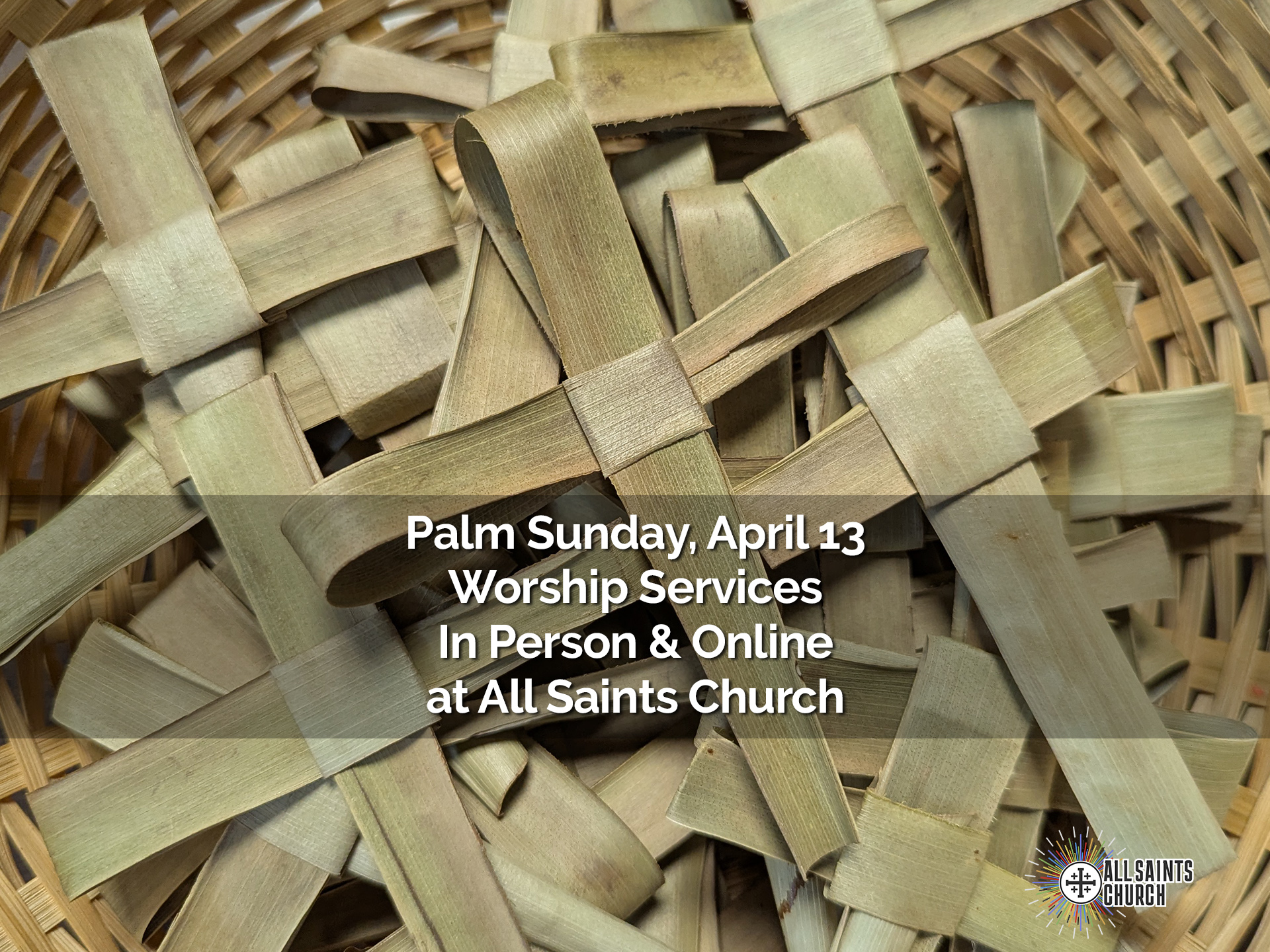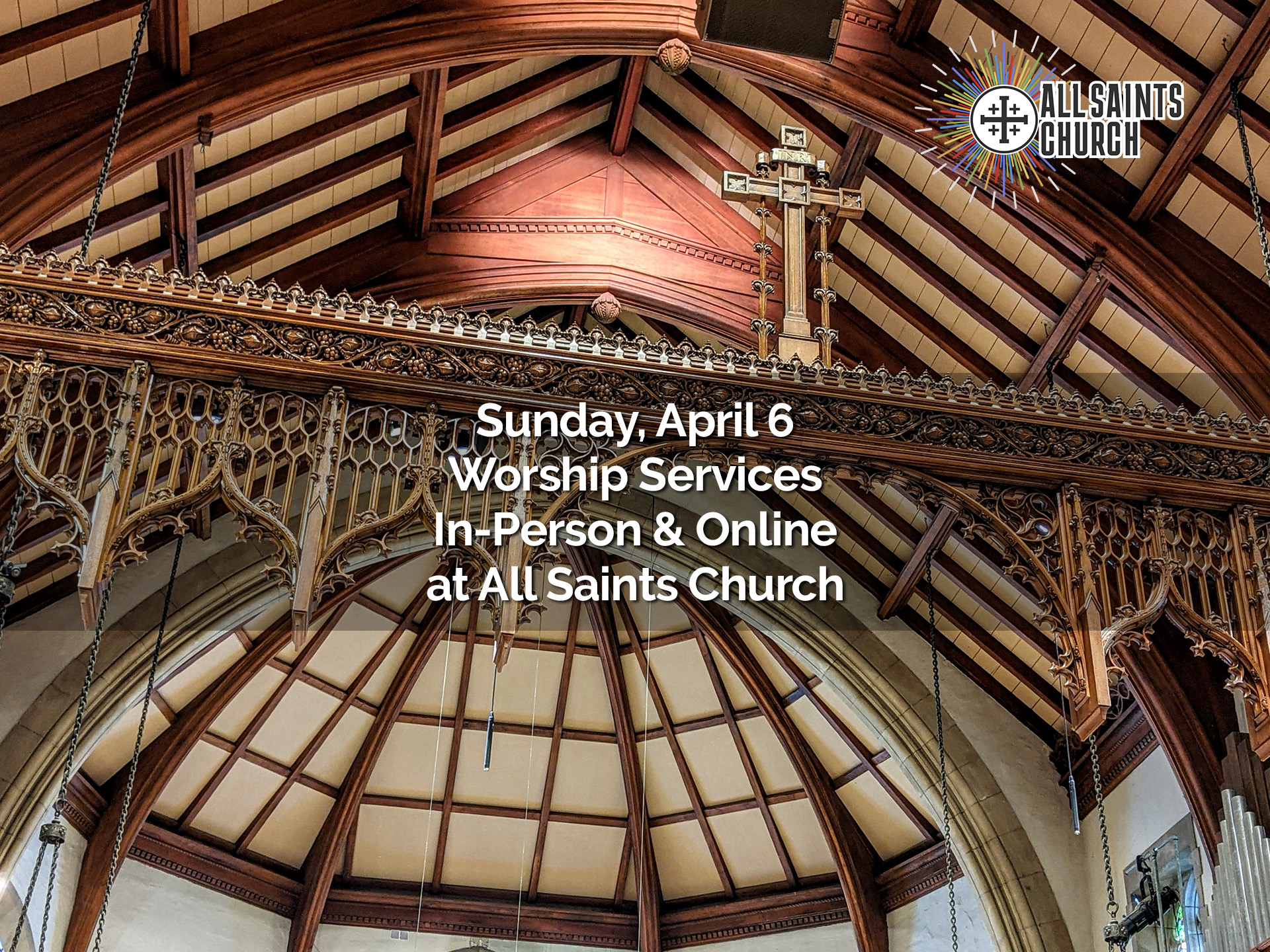“God’s saving power emerges again and again from the margins and calls us to the work of mutual redemption.”
Sermon by Sally Howard at All Saints Church, Pasadena, on Sunday, December 23, 2018.
When Elizabeth heard Mary’s greeting, the baby in her womb leaped. Filled with the Holy Spirit, Mary and Elizabeth sang. Amen
The visitation is a thrilling moment in history when the regard of two women for each other disrupts the groove of the world. Amidst chaos and crisis, and a political system aimed to crush, Mary and Elizabeth recognize that they are co-creators with God, (endowed with power and birthing energies that can set the world right.) We call this a kairos moment-a time pregnant with infinite divine possibilities for a new way of being in the world, a new way of being with one another and even a new way of being with God.
We live in our own kairos time, swirling with chaos and crisis—but also a time of divine possibility. What does it mean for us to be a people of Advent in our time of 2018? The visitation points the way.
Happily, it is a meeting filled with joy. Elizabeth and Mary love and esteem each other. They recognize the face of God in each other, and see that God’s creative power dwells deeply within each of them. I’ve felt it at a Jewish friend to Shabbat dinner and in the blessing of a Muslim brother. I’ve experienced it with many of you here, sometimes when I walk down the aisle, or in a gaze at the rail. It heals my heart in a way I didn’t even know it was broken. I’ve longed to give that recognition to ones I can’t reach. I’ve longed for it too in my own life, when it seems in short supply. Being recognized in our deepest humanity is one of the most powerful needs we have. When we do recognize the blazing diamond light that dwells at the center of each other, we release birthing energies of God within us that can change the world. Our hearts sing and our imaginations soar beyond the walls that divide us towards a world governed by peace and justice.
It could have been otherwise for Mary and Elizabeth, even though they were family to one another. Many of us know that being family doesn’t guarantee the mutual recognition we long for. Furthermore, Mary and Elizabeth were desperately poor and their land violently occupied. (They swam in a sea that devalued their bodies and obscured their worth as bearers of God’s presence.) One is old, the other is pregnant and unmarried—they are women of color. In the Roman hierarchy of domination, they are at the bottom of the heap. Even their religious culture tells them they can’t access God unless they go through a man. Elizabeth and Mary could have passed that devaluing on to each other-as we human beings sadly often do. They could have acted out of scarcity and fear, even competed with each another. But they didn’t. They chose to stand in solidarity and mutality. They exemplified power-in-sharing. As they did so, they became participants in God’s divine re-creative action bringing new life into the world.
Their visitation is also about power, human and divine. About where and in whom God’s power is most present. We often associate Mary with Elizabeth, the mother of a special child. But Mary is also linked with Hagar, rejected and thrown into the wilderness, and with Miriam, who led the dance of liberation. The Magnificat could be the song of Leah, the rejected sister, or of Ruth, a woman independent of patriarchy, and so many others. Whom has God chosen?
Often, those from a despised race. Not the powerful or the status conscious, but women whose power is of a very different nature.
You see God’s redemptive plan came through Jesus, but Jesus came through the body of a young woman on the margins. God’s saving power emerges again and again, from the margins-from the borders and prisons and neighborhoods plagued by violence. Jesus’ own prophetic consciousness developed in relationship with a mother whose song of protest we honor today. The redemptive/reconciling action of God continues in us as we love and honor each other. Mary calls us to the mutuality of redemption–to the fulfillment of our need to be God’s presence for each other.
The visitation also tells us about the nature of God’s power. God exists as relationship between the Creator, Redeemer and Sustainer — a waterwheel of self-emptying and ever refilling love. God’s power and beauty is this outpouring love that chooses vulnerability with us. (In the Christ child, God Emmanuel is God with us and for us all. As Julian of Norwich described it, “It is Jesus,” she wrote, “who takes us tenderly to breast and feeds us.) Jesus is the ground where Motherhood begins.” As Jesus’ life will reveal, self-emptying love has power no dictator can even begin to imagine.
Bearing up the divine in the world’ is the task of all Christians, and it is at the heart of the visitation story. The openness and vulnerability of motherhood are prerequisites for all of us, male, female, and gender fluid persons. I am not speaking of the biological capacity to carry and birth a baby, but motherhood symbolizing the creating and birthing energies of God that dwell in us. God is always creating and birthing in us, beauty and liberating action in the world. Here, vulnerability is seen as strength, not weakness. It takes strength to ‘bear up God in the world’. When we align ourselves with power used for and with others, we move against the groove of the world.
The Magnificat is a song of joy, and it is a song of danger. It tells of God’s preferential love for the lowly and the abused. It is shocking and revolutionary. (Doesn’t God love everyone? Yes but) in an unjust world, the form that universal love takes differs according to circumstance. Mary’s song makes it clear that divine love is particularly on the side of the poor, noticing their tears, while challenging the comfortable and the proud to conversation, and even the loss of their own comfort.
Mary sings of God’s victory over those who dominate others and of her solidarity with divine outrage over the degradation of life. Her Canticle praises God for salvation that involves concrete transformation. Salvation that will not stop short of subverting all structures of oppression. It awakens resistance and inspires hope.
The Magnificat was banned from being sung or read in India under British rule. In the 1980’s, it was banned in Guatemala. In addition, during the Dirty War in Argentina, the Mothers of the Plaza de Mayo—whose children all disappeared, placed the Magnificat’s words on posters throughout the capital plaza. In response, the military junta of Argentina outlawed any public display of Mary’s song. There are more subtle ways of suppressing Mary’s prophetic power. Even in our own tradition, we have portrayed Mary as sexless and compliant—and white.
God’s redemptive power is in God’s vulnerability and solidarity with us. In their recognition of God’s presence in each other, Mary and Elizabeth reflect the very being of God’s creative power. In the most radical way, Mary and Elizabeth call us to seek out true “visitation” with each other.
In this our kairos moment, who is God inviting you to visit?
At an earlier point in my life, I volunteered at a continuation school in Pasadena for teenagers who had unable to perform in regular public high school. I met with 18 youth and a school counselor for 90 minutes a week. Most were youth of color, and all were having difficulty staying in school, even in this setting of more relaxed expectations. In fact, all were failing in this the last school option. Over the course of the year, I began to understand why being in school and concentrating was barely possible for them. One was caring for a grandmother who was dying of cancer; another trying to raise younger siblings for a mother who worked two jobs. Another was caring for a psychotic parent and only came when she thought her parent was safe enough to leave; yet another was struggling daily to stay sober. One young man we named the poet because of his articulate and powerful speech. He almost gave up one time, after witnessing the near death beating of his neighbor by police. (All that year, I listened and wept.) I was struck to consciousness of how protected I had been as a high school girl and how that had made it possible for me to concentrate and learn. Over that year, I often felt inadequate and uncomfortable. But just holding the space, I recognized the incredible brilliant light within each of these kids. As time went by, they began to recognize and support each other. And they recognized me too, despite my faltering ways, paying me the highest of compliments and inclusion, that of being their homegirl. The recognition and support they gave each other in those meetings changed their education for each of them. Each graduated at the end of the year, many on the honor role. And me? I knew far more about who I was and what I was meant to do, and what I might become, because they saw me.
Mary’s message is crystal clear. We are all God bearers. It is our kairos time, pregnant with infinite divine possibilities. It is time to disrupt the groove of the world! Time to be midwives for each other! Let us go out empowered by the Spirit and birth God’s beauty and liberating action into the world.
Amen



